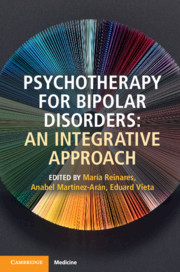Book contents
- Psychotherapy for Bipolar Disorders: An integrative approach
- Psychotherapy for Bipolar Disorders
- Copyright page
- Contents
- Collaborators
- Preface
- Part 1 An Introduction to Treatments
- Part 2 The Foundations of an Integrative Approach to Bipolar Disorders
- Chapter 2.1 Psychoeducation for Patients and Family Members
- Chapter 2.2 Promotion of a Healthy Lifestyle
- Chapter 2.3 Mindfulness
- Chapter 2.4 Cognitive and Functional Remediation
- Part 3 An Integrative Approach to Bipolar Disorders
- Book part
- Bibliography
- Index
Chapter 2.4 - Cognitive and Functional Remediation
from Part 2 - The Foundations of an Integrative Approach to Bipolar Disorders
Published online by Cambridge University Press: 18 October 2019
- Psychotherapy for Bipolar Disorders: An integrative approach
- Psychotherapy for Bipolar Disorders
- Copyright page
- Contents
- Collaborators
- Preface
- Part 1 An Introduction to Treatments
- Part 2 The Foundations of an Integrative Approach to Bipolar Disorders
- Chapter 2.1 Psychoeducation for Patients and Family Members
- Chapter 2.2 Promotion of a Healthy Lifestyle
- Chapter 2.3 Mindfulness
- Chapter 2.4 Cognitive and Functional Remediation
- Part 3 An Integrative Approach to Bipolar Disorders
- Book part
- Bibliography
- Index
Summary
Cognitive functions encompass the mental processes that take place in the brain, in the central nervous system, related to thinking, decision making, planning, paying attention, remembering. In recent years, the increasing prevalence of dementia in the general population has led to a growing interest in stimulating cognitive functions. This greater awareness of the importance of preserving and improving our cognitive functions has been accompanied by a proliferation of brain training programmes, especially with the expansion of new technologies. Even so, neuropsychological rehabilitation and its application in different pathologies have been in use for more than a century. While different assessments and treatment procedures for brain injury began to be developed in the 1970s, neuropsychological evaluations acquired a relevant status in the world of psychiatry in the late twentieth century, with a particular focus on schizophrenia. Currently, the study of cognitive functioning has been extended to other psychiatric illnesses, especially affective disorders such as bipolar disorder and depression.
- Type
- Chapter
- Information
- Psychotherapy for Bipolar DisordersAn Integrative Approach, pp. 50 - 60Publisher: Cambridge University PressPrint publication year: 2019

